Report by Kamgar Ekta Committee (KEC) correspondent
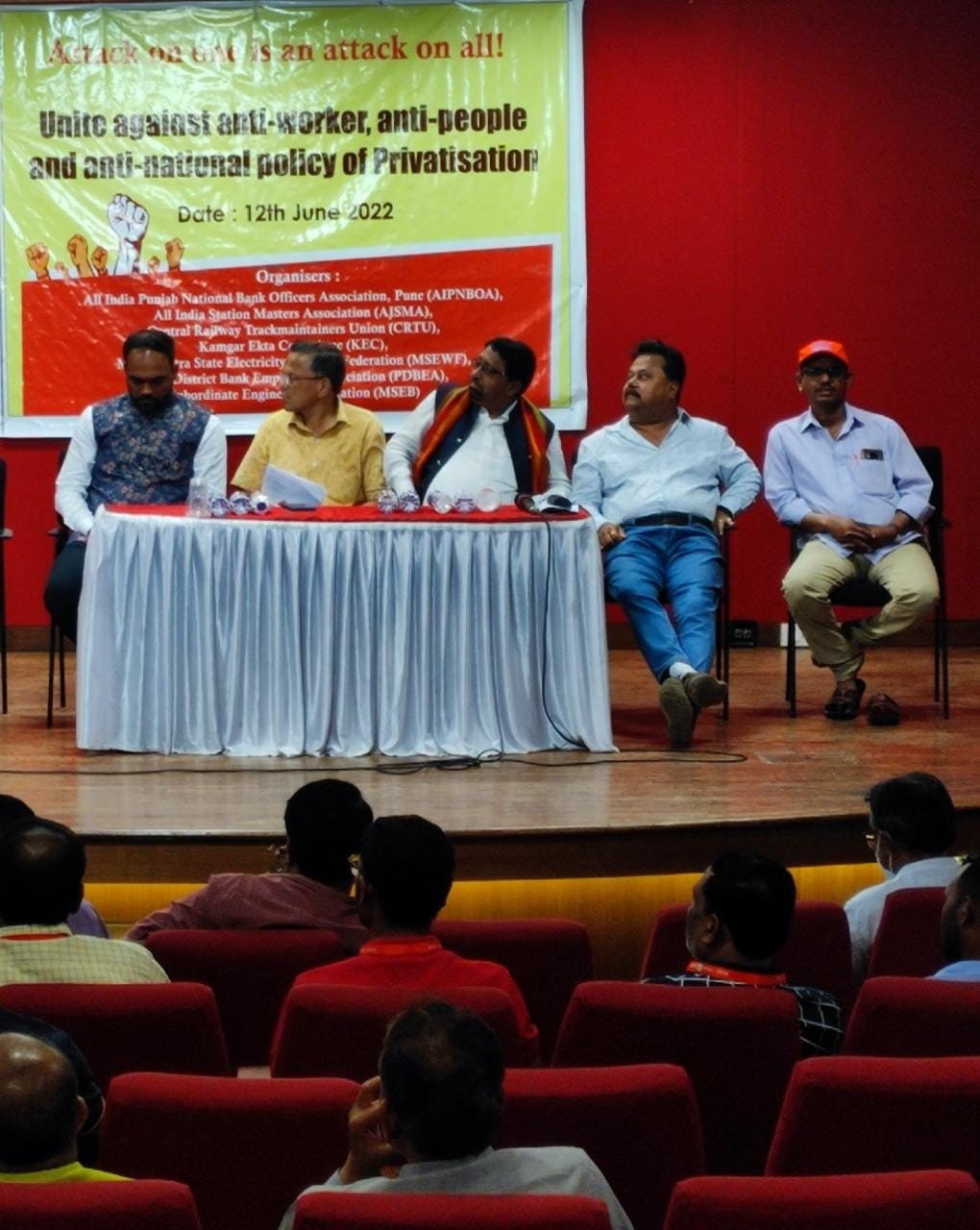
To develop a joint action plan against the anti-worker, anti-people and anti-national policy of privatisation, different organisations of banking, electricity and railway sectors as well as people’s organisations organised a physical meeting at the Patrakar Bhavan in Pune on 12 June 2022. The organisers included All India Punjab National Bank Officers Association (AIPNBOA), All India Station Masters Association (AISMA), Central Railway Trackmaintainers Union (CRTU), Kamgar Ekta Committee (KEC), Maharashtra State Electricity Workers Federation (MSEWF), Pune District Bank Employees Association (PDBEA), and Subordinate Engineers Association (MSEB).
Over a hundred people participated in this historic meeting including leaders of the defence sector, professors’ association and people’s organisations.
Shri Pradip, Secretary of Kamgar Ekta Committee (Pune), welcomed the gathering on behalf of the organisers and invited Shri Girish Bhave, Joint Secretary of KEC to conduct the meeting. Shri Shailesh Tilekar (General Secretary, PDBEA), Shri Dashrath Nagrale (President, CRTU, Pune Division), Com. Krushna Bhoyar (General Secretary, MSEWF, and National Secretary, All India Federation of Electricity Employees), Shri Vitthal Mane (President, All India Punjab National Bank Officers Association, AIPNBOA and Organising Secretary, All India Bank Officers Confederation, AIBOC, Maharashtra and Goa) and Shri Sunil Jagtap (Senior Vice Chairman, All India Power Engineers Federation, AIPEF) were the leaders of the various unions who were members of the Organising Committee and addressed the meeting.
All these leaders thanked the Kamgar Ekta Committee (KEC) for taking the initiative to get everyone together and many of them also highlighted the important role played by the All India Forum Against Privatisation (AIFAP) in the fight against privatisation. Please see boxes for the highlights of their presentations.
On behalf of KEC, Shri Ashok Kumar presented an overview of the privatisation and highlighted the fact that privatisation has been stopped wherever the workers were able to educate the common people about the harmful effects it has on them and mobilise them to join the fight against it.

(The video is also available at the end of the report.)
After the speeches of the organisers, Com Sunil Bajare (President, Pune Division of the National Railway Mazdoor Union), Dr. Geeta Shinde ((President, Savitribai Phule Teacher’s Association of the Pune University), Com. Mohan Hol (All India Defence Employees Federation) and Ms. Sheena (National Spokesperson, Purogami Mahila Sangathan, and member, KEC, Pune) were called upon to express their views.
Other eminent activists and leaders who participated in the deliberations included Dr. Sanjeewani Jain, Vice President, Lok Raj Sangathan, Ms. Bharati Bhoyar, Leader, Women’s Front of Maharashtra State Electricity Workers Federation (MSEWF), Ms. Neeta Ghag, Joint Secretary, All Indian Bank Employees Association (AIBEA), Pune Unit, Shri Shirish Rane, Pune District Bank Employees Association and Shri Nitin Pawar, activist. Leaders of All India Station Masters Association (AISMA) and many others who could not attend sent their best wishes for the success of these deliberations.

At the end of the meeting, Shri Girish Bhave, on behalf of the organisers, presented a resolution based on the deliberations and it was unanimously passed by all the delegates present on this occasion. (The resolution is also available at the end of the report.)
To the best of our knowledge this meeting is the first such public meeting in Maharashtra where workers of various sectors and people’s organisations have come together and the meeting will surely inspire many more to join the campaign against privatisation.
Highlights of the speech by Shri Shailesh Tilekar (General Secretary, PDBEA)
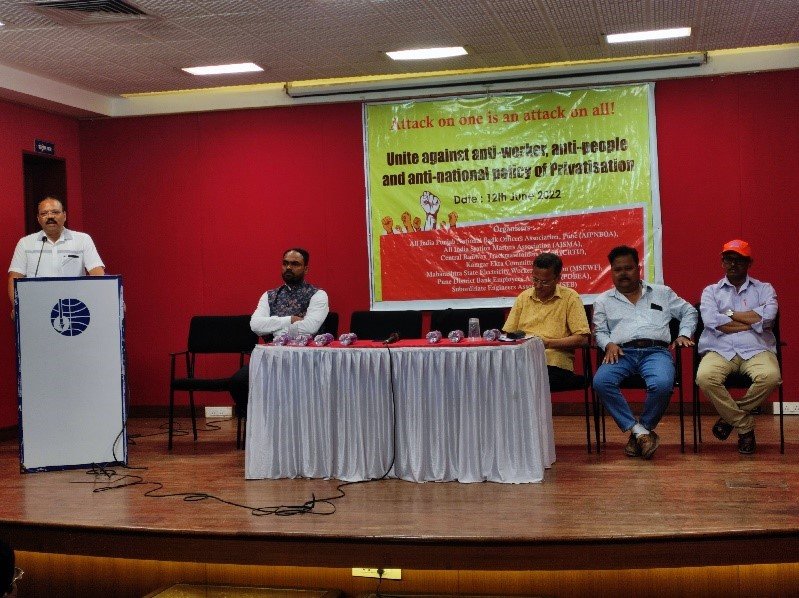
After the liberalisation, privatisation and globalisation policy of 1991, the state of public sector banks has been deliberately weakened, especially via write offs, non-performing assets (NPAs) and mergers.
In the last 10 years alone, of the total corporate loans, 82% were declared NPAs or loans that big corporates will not pay back!
The National Company Law Tribunal has given write offs of lakhs of crores to corporates such as Videocon Industries.
Bank mergers have led to the closure of nearly 6000 bank branches in rural areas.
These policies are meant to increase profit of corporates.
By criminalising wilful defaulters and forcing them to repay, the savings interest rates can be increased and more loans could be given to common people.
Write offs of corporate loans have caused banks to go into loss in the first place. Now, the same corporates want to buy banks!
We have to fight unitedly to save banking for public welfare.
Highlights of the Speech by Shri Dashrath Nagrale (President, CRTU, Pune Division)
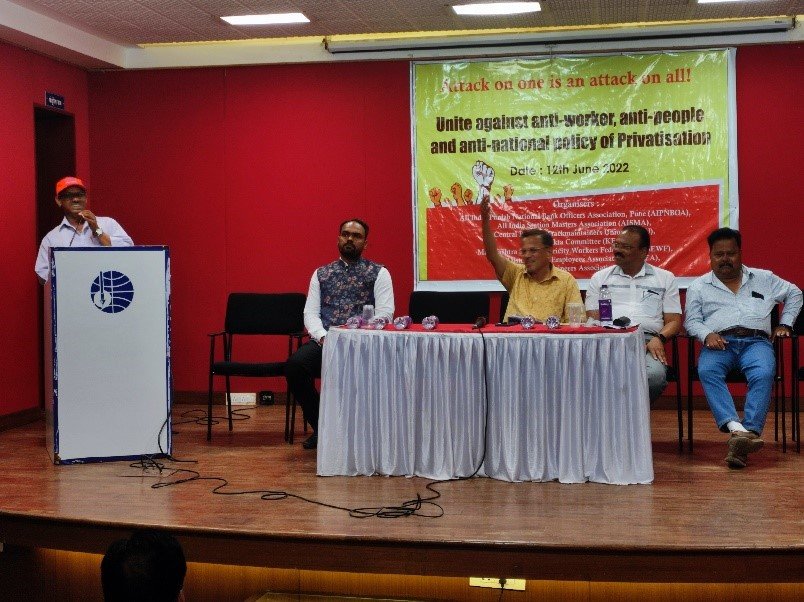
I have been working as a track maintainer in Pune for the last 20 years.
Track maintainers make many sacrifices for the safety of passengers. One track maintainer dies on duty every day in Indian Railways, because nothing is being done to ensure their safety.
There are many cases of suicides due to non-availability of leaves and unbearable working conditions.
Workers, including children, are hired as trackmen on contract basis. These workers are not trained and they receive the lowest possible wages.
Contractualisation and privatisation in railways leads to critical jobs being done by untrained workers, and thus compromises the safety of passengers, and hence the fight against privatisation is a fight of the passengers too.
Highlights of the presentation by Shri Ashok Kumar (Joint Secretary, KEC)
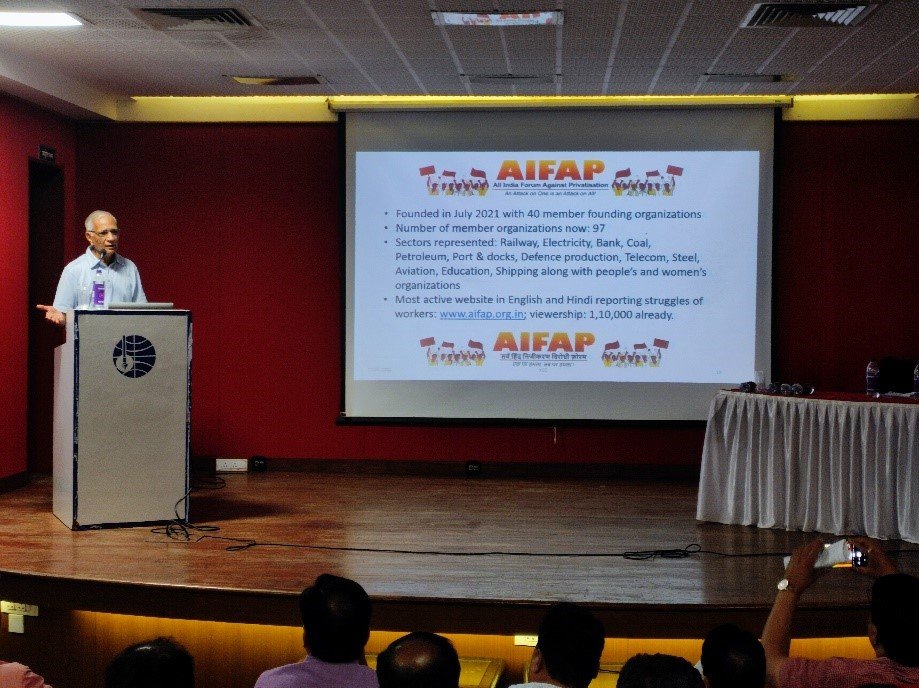
The corporate agenda of privatisation has remained the same though parties at the centre and their strategies have changed.
The government has been trying to weaken workers’ struggles by making false promises and misleading statements, but the experience of electricity workers in Puducherry and Maharashtra for instance has shown that we cannot depend on them.
There are many examples of successful struggles; the common feature has been the education and involvement of people at large.
An attack on one is an attack on all and we have to unite against privatisation and involve consumers.
Highlights of the speech by Com. Krushna Bhoyar (General Secretary, MSEWF, and National Secretary, All India Federation of Electricity Employees)
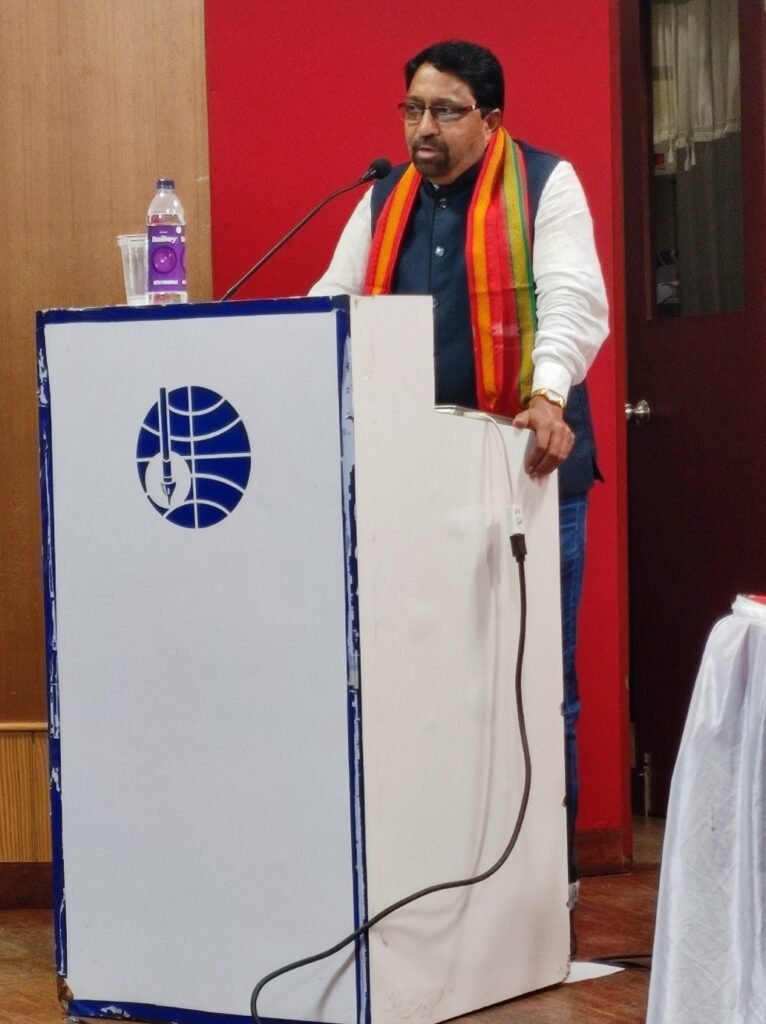
Irrespective of the party in power, workers and the ten central trade unions of our country, including AITUC, have been fighting against the government’s policies for decades.
However, workers have been fighting for their separate sectors and do not know what is happening in other sectors.
The government is trying to break our unity by distracting us with issues like mandir-masjid.
AIFAP needs to be thanked for uniting leaders of all sectors during the lockdown.
Attending AIFAP meetings gives workers the opportunity to understand what is happening in coal, steel, defence, railways, banks, insurance and other sectors. The handing over of public assets to private hands is a dangerous attack on the people.
The industries that built the nation are being sold.
Government policies are responsible for the putting electricity distribution into loss.
Privatisation of electricity distribution will lead to higher charges and no electricity supply in rural and tribal areas even though currently Maharashtra has generation surplus of 1000 MW.
I urge all sectors to unite and take the fight against privatisation to the crores of people of Maharashtra.
Highlights of the speech by Shri Vitthal Mane (President, AIPNBOA, and Organising Secretary, All India Bank Officers Confederation, Maharashtra and Goa)

I appreciate the opportunity to share the dais with leaders whom I did not know earlier: I got the opportunity to learn a lot about electricity and railways from the other speakers.
Public sector banks allow zero-balance accounts, provide education loans and mudra loans, and even provide loans of small amounts of a few thousand rupees, while private banks do not.
A huge part of the country’s population involved in agriculture is dependent on small loans. Privatisation of banks will deprive them from banking services and farmer suicides will increase.
I request railway, power, coal, steel and other leaders to provide detailed information about the privatisation going on in their sector, so that this information can be collectively taken to the public. In February, AIBOC took out a rath yatra to oppose privatisation; workers’ protests led to the bank privatisation bill to be taken back. If we go among the public in such a manner, we will definitely win because unity is our power.
I assure that AIPNBOA will participate in all such future meetings.
Highlights of the speech by Shri Sunil Jagtap (Senior Vice Chairman, AIPEF)
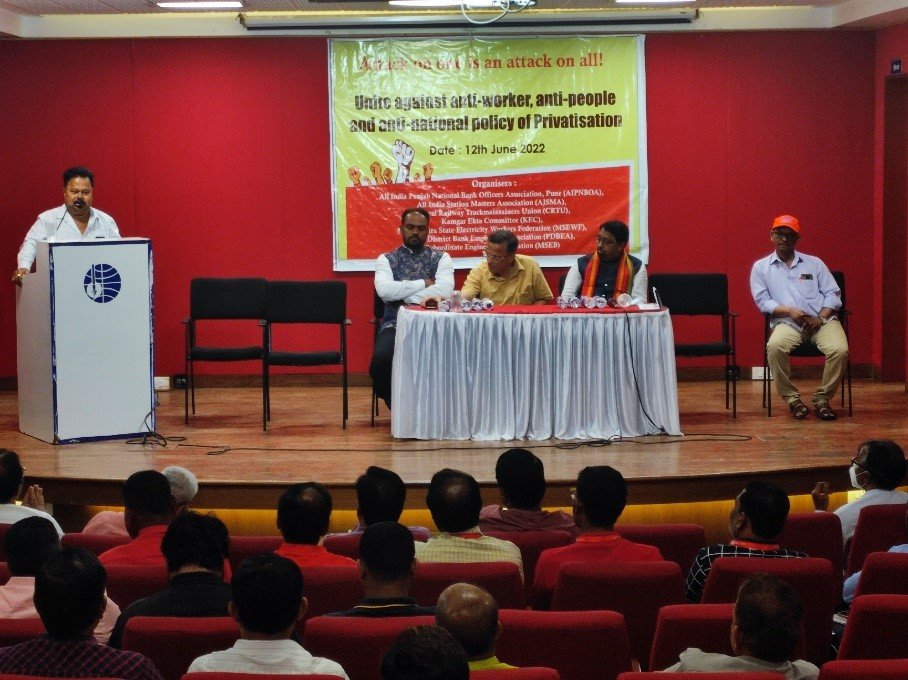
Government policies are responsible for the loss in the power sector; it provides subsidies in electricity, but has not paid the subsidy amount to MSEB. Electricity workers demand that it pay their arrears.
Tata, Birla and other capitalists were the ones who advised the Nehru government to nationalise sectors like roads, power and water as these sectors would require a lot of capital.
Now, these big capitalists have grown their wealth and are ready to take over the public sectors.
The propaganda that privatisation will enable consumers to choose their electricity distribution company is utterly false. In fact, it is the private player who chooses the consumer, and urban areas like Pune will be the first to be privatised.
Consumer support is essential for the struggle.
Highlights of the speech by Com. Sunil Bajare (President, Pune Division of the National Railway Mazdoor Union, NRMU)
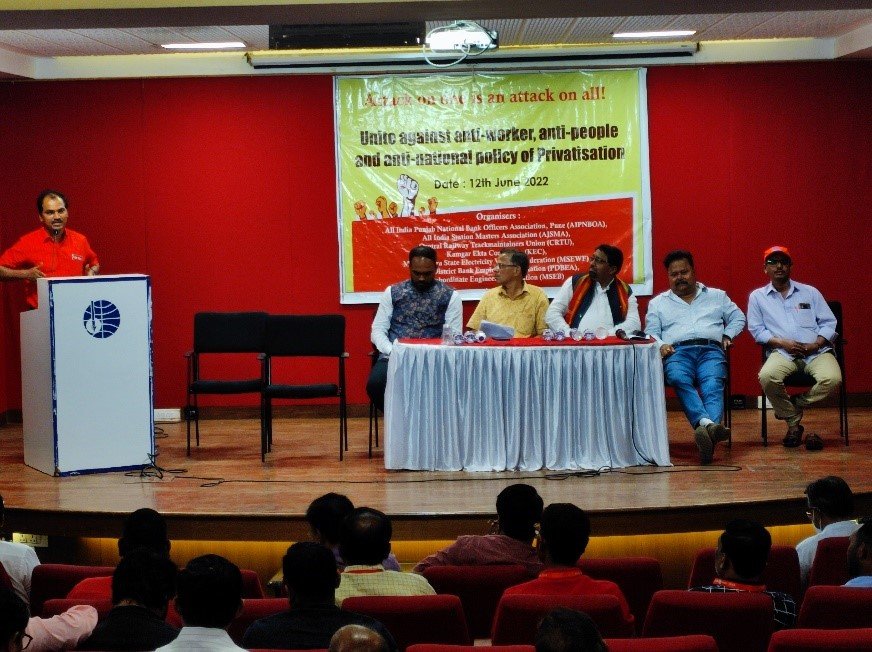
The private Tejas Express covers the distance between Delhi and Lucknow in only 10 minutes less than the government’s Rajdhani, but its ticket fare is double that of the Rajdhani!
Indian Railways provides nearly 106 types of concessions, which will be discontinued after privatisation. Thus, all workers and daily wagers will suffer.
Privatisation is being pushed although public sector workers have been providing essential services even during the pandemic. Railway workers did the critical work of transporting food and medicine during the lockdown.
Railways are also of strategical importance for transporting ammunition in cases of emergency, so the sale of railways is a national security concern.
The government is trying to distract and divide us on communal issues. However, we must unite despite party or union affiliations to stop privatisation.
Highlights of the speech by Dr. Geeta Shinde (President, Savitribai Phule Teacher’s Association)
Teachers are also workers and the education sector is related to all other sectors.
Teachers in government educational institutions have low salaries and the quality of these institutions has been deliberately weakened to promote private institutions.
Instead of preparing a policy to address the existing issues and fundamental needs in the education sector, the government is set to further push privatisation via the New Education Policy!
Government education is a fundamental need that should be affordable to all.
Highlights of the speech by Com. Mohan Hol (Treasurer, All India Defence Employees Federation)
The government first initiated divestment and FDI in the Ordnance Factories Board (OFB), which manufactures guns, bullets, ammunition, parachutes, uniforms and other equipment.
When the corporatisation of OFB was announced, defence workers started an indefinite strike in October 2020. However, the government introduced the Essential Defence Services Act to stop the workers from striking and corporatized OFB in 2021.
The defence industry is not meant for profit, but private players will use it only to maximise their profit, thereby compromising the safety of the country.
Defence workers will continue to fight against privatisation, continue to support AIFAP and together we can stop the government’s anti-worker policies.
Highlights of the speech by Ms. Sheena (National Spokesperson, Purogami Mahila Sangathan, and member, KEC, Pune)
The government’s arrears in electricity and railways and NPAs worth lakhs of crores reveal that the country’s wealth is being used for fulfilling the capitalist agenda and not for the people.
Policies should not be made by one party or the other but by workers.
The workers of one sector are consumers of all others, so consumers should be involved in our fight.
Though the mainstream media is not of the workers, the participation of youth can help us use social media and build alternative media of the workers.
Through the strikes of electricity and railway workers in which their demands were fulfilled within 48 hours, it is clear that workers have strength. We have to realise our power.
We should now go on the offensive. Instead of limiting ourselves to fighting the anti-worker policies of the government, we should start asking questions and holding the government accountable.
Upload.Pune Resolution
